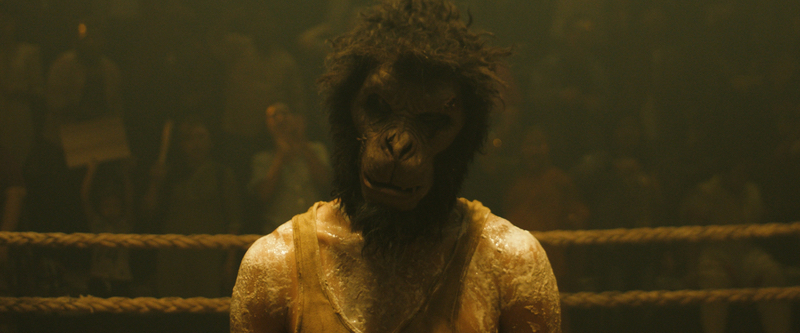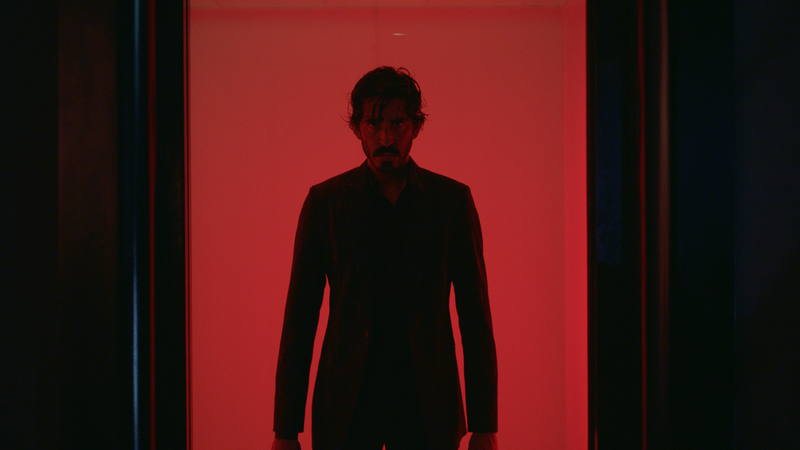Dev Patel’s “Monkey Man” is a genre-bending actioner. The film uses folklore and socioeconomics to tell a thoroughly engaging story that spotlights Indian cinema. The raw camera work brings a new kind of brutality to the story of an underdog seeking vengeance and fighting for the oppressed.

Dev Patel is Kid in MONKEY MAN, directed by Dev Patel
“Monkey Man” follows Kid (Patel), a young man who is on a quest for vengeance against the corrupt leaders who murdered his mother and continue to victimize the poor and powerless systemically. He gets beaten into a bloody pulp in underground fight clubs. His earnings are meager and barely enough to scrape by. He wears a monkey mask to build a persona of an underdog getting overpowered by other predators. These fights are a means to an end as they bring him closer to the very people who took his mother away from him, including Rana (Sikandar Kher), the police chief who murdered Kid’s mother and burned his village to the ground.
Flashbacks reveal the loving relationship Kid had with his mother. We see her tell tales of the Hanuman – a monkey whose ambition to reach for an impossibly high fruit ends up leading to being punished by the gods. The figure is meant to teach the value of humility and selflessness, which leads to living a more fulfilling life. As such, when he finally finds a way to infiltrate the corrupt system, he takes it and soon climbs up the ladder to get closer to the murderers and corrupt powers that killed his mother.
“Monkey Man” isn’t a straightforward actioner. It takes a different approach to the exposition by touring the city and the seedy underground and profiling the characters that inhabit that space. As such, we quickly get acquainted with the political and socioeconomic landscape. Kid navigates this uncharted world where there is danger at every corner. However, he does have some help using a network of thieves to steal Queenie’s wallet. Queenie is the manager of a hotel that Rana frequents. This wallet gets passed around the slums quickly, informing its audience of the setting and the trust this community has built. At the same time, shots of the upper-class neon-lit hotels reveal that the privileged live a life of luxury through the pains of the oppressed. The sequence shows audiences the giant wealth gap between the haves and have-nots.

Those who are privileged often exercise their dominance over those who are beneath them, knowing full well that the oppressed cannot retaliate. Kid’s friend and inside man Alfonso (Pitobash) is constantly ridiculed for a drug deal that went south that cost him his leg. Sita (Sobhita Dhulipala), one of Queenie’s escorts, helps prepare Kid for the realities of working for someone like Queenie. The sight of her being violated repulses Kid and reawakens previous traumas. So, her inclusion is vital to establishing a deep understanding of the underbelly and giving Kid a broader view of who he is fighting for.
Though the build-up takes its time, the audience’s patience is rewarded with an absolute banger of an action sequence that takes place in a bathroom. Kid’s experience of getting beat up shows as he can take in punches and kicks. However, his inexperience will be his undoing. Though he’s been practicing firing a gun at a poster, he is unable to shoot his intended target when he is in front of him with the weapon he’s smuggled into the hotel. Kid eventually has to fight between other hotel staff and security and a wild escape, a scene that has echoes of “Oldboy,” “The Raid 2,” and just about every outmatched fight the “John Wick” films. The camera work is raw as it violently shakes, following Kid’s every jump and footstep. The sequence also shows how inexperienced and ill-prepared Kid is as he tries to escape through a high-rise window but ends up hurting himself as it doesn’t shatter like the ones in the movies.
“Monkey Man” isn’t just an ordinary action revenge-seeking thriller. It is layered with depth and nuance. When Kid suffers a near-fatal setback, he is taken in by a small hijra community. As transpeople, they are outcasts, driven out by society to decrepated temples. Alpha (Vipin Sharma) helps Kid recover from his injuries and reignites the spark of vengeance through a spiritualistic reawakening. Alpha recognizes that the burns on Kid’s hands are physical and emotional traumas that he’s carried with him all his life. Though Kid sees his hands as constant reminders of his purpose in seeking revenge, Alpha sees them as a brave child who valiantly tries to save his mother. Including someone like Sharma in the film gives the trans community a space to show their humanity and worth. It also spotlights their struggles to live as a scene reveals how the police continuously threaten to drive them out of their homes by leaving violent messages on their doorsteps.

Being taken in by Alpha only strengthens Kid’s resolve. It is a second act that interlaces folklore with action. However, that does slow the film down to a crawl. And yet, the flashbacks, moments of reflection, and biding of time give Kid a chance to recoup and rethink his approach to achieving his goal of revenge. A training montage where Kid punches a bag of rice rhythmically as a drummer plays the Tabla, and the transwomen cheer him is a transformative experience. Before entering the temple, he was driven by vengeance and rage. However, Kid’s time to heal and bond with Alpha gave him the clarity he needed to see that he was fighting for more than himself. He is fighting for those who can’t. So, while the second act was designed as a breather, it may be a disappointment for those looking for “Monkey Man” to be a continuous stream of action-packed fight sequences.
There’s no taking away from what Patel has done here, especially with the action sequences. “Monkey Man” is undoubtedly an action film with cultural and emotional nuance. It has something to say and doesn’t hold back by using striking visuals and bloody violence. The camera work is raw and shaky at best, a far cry from the usual clean-cut sequences that we get from John Wick or Atomic Blonde. But that is far more to the film’s benefit as it shows it isn’t afraid to do something different. It may be filthy and disorienting at times, which makes it hard to engage with or know where to look, but the brutality of it all is clear as day. And Patel puts himself through so much, physically and emotionally, to ensure that the socioeconomic disparity he is commenting on is apparent.
Also evident is the message that “Monkey Man” is sending. The cultural and emotional layers give it depth and nuance, while the socioeconomic commentary helps contextualize Kid’s heroic journey. The film is a character-driven film about a man who slowly starts to see that all of the pains he has endured are far more widespread than he initially perceived. He is fighting for an underserved community oppressed by corrupt political and religious figures. He is also fighting for those who have been cast out because they are different. Patel, who wrote the script with Paul Angunawela and John Collee, gives us something more than the traditional action hero seeking vengeance. The three provide global audiences with something so profoundly electric that it proves Indian cinema can be more than just Bollywood.
8/10











